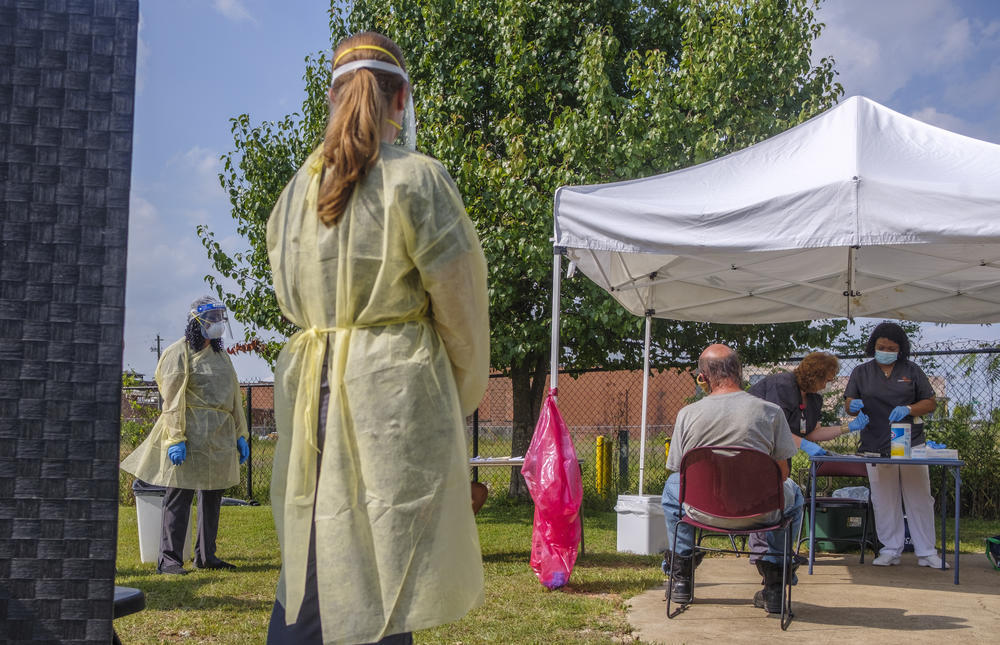
Caption
Daybreak homeless day center provides coronavirus testing in Macon. / Georgia Public Broadcasting
Credit: Grant Blankenship
Macon organizations that help the homeless struggle during pandemic

Daybreak homeless day center provides coronavirus testing in Macon. / Georgia Public Broadcasting
As middle Georgia continues to deal with the coronavirus, Macon’s homeless are receiving help from a patchwork of local non-profits banding together to help during this time of economic and public health uncertainty.
The numbers of those needing assistance are only expected to climb as extra payments for unemployment are set to end and Congress sits at a standstill when it comes to approving additional stimulus funding. Protections for those teetering on the edge of eviction are also expiring.
Matt Desmond with Princeton University’s Eviction Lab told NPR that when protections expire, the country could see mass evictions and homelessness. In Macon-Bibb County, by the end of July, officials are expected to begin working through a backlog of evictions dating back to March.
“I think you’re going to see an increase in unemployment and an increase in homelessness,” Director of Macon’s Daybreak homeless resource center Theresa Sullivan said. “There are a lot of people who we don’t even realize are on the edge of being homeless.”
In the meantime, organizations like Daybreak are trying to help. The center is part of a web of nonprofits helping Macon’s homeless. And while they provided food, showers and other resources to homeless people before the pandemic began, that work is taking on greater importance with COVID-19. The work has required changes.
“We’re rethinking everything,” Sullivan said. “How do you provide every single service from six feet apart?”
In order to reduce the spread of the virus, Daybreak and many other local organizations are limiting the number of people in their facilities. This is on top of requiring face masks and temperature checks before entry, Sullivan said. That reduces the number of people these organizations can serve.
“It’s made it harder for them to get services because there have been so many restrictions put in place on the places that are giving out handouts,” said Sean King, founder of the faith-based homeless organization Train Trestle Ministry.
But the pandemic has also placed homeless people in a vulnerable position.
Without housing, they are unable to shelter in place, creating more opportunities for possible coronavirus exposure. In some cases the homeless also lack access to proper sanitation.
It’s also harder to be screened for COVID-19 with many of the testing sites only open via drive through. Testing set up for the homeless is limited and receiving up-to-date information on the coronavirus is harder with limited access to televisions and phones to follow the news, Sullivan said.
On top of that, many of the federal programs intended to provide economic relief are harder for homeless people to access. Sullivan says many they help do not have the technology needed to sign up for these programs.
“We worked with everyone to get them signed up for their stimulus package,” Sullivan said. “Because how do you do that if you do not have access to the internet or a phone?”
As the pandemic drags on, local organizations like Daybreak, Loaves and Fishes and others are trying to fill the need facing Macon’s homeless population in the context of a wildly different public health environment.
Macon’s Christ Episcopal Church serves free lunches every weekend as part of their “Weekend Lunch Ministry.” According to the program’s director, Hal Brickle, while they traditionally served hot meals, COVID has caused them to transition to handing out bagged lunches.
Brickle said lately they’ve been serving around 200 people on any given weekend.
Some organizations, like Daybreak and Christ Episcopal Church, also saw a lot of their volunteers — many of whom are older — sidelined due to their increased health risk. For Daybreak, Sullivan estimates that’s around 80% of her volunteer base temporarily unable to help.
But beyond meeting their basic needs, both Brickle and Sullivan said the coronavirus has taken a mental toll on many of the homeless.
Sullivan said many rely on using restaurant bathrooms and spending the day in local libraries to get some relief from the summer heat. When those places closed, it made it more complicated for the homeless to get through the day.
“One of them said to me, ‘They’re leaving us out here to die,” Sullivan said. “Those may seem like simple resources but as everything closed down at one time — that was really rough.”
And while Macon-based homeless organizations have tried to forge ahead, they haven’t been immune from having to close due to the coronavirus.
For instance, Daybreak had to shut down for two weeks after coming in contact with an asymptomatic coronavirus carrier, Sullivan said. They reopened July 15. Earlier in the pandemic, Loaves and Fishes had to close after a possible coronavirus exposure as well.
Brickle says this uncertainty has an impact.
“Being homeless, the consistent things are pretty standard. We’ve already changed that consistency, of knowing that this place is open and this is going to be happening,” Brickle said. “It’s sort of, ‘Where do I go now?’”
The rapid change is drawing local homeless advocates into closer collaboration. They touch base via Zoom every week to update one another on any possible changes, challenges and trends they are seeing, Brickle said.
“We pretty much know who’s doing what, when it’s happening, what services are being provided — we know where to point you to go,” Brickle said. “So us working together from these organizations helps us coordinate the population and let them be more aware of the services and how it may have changed.”
As of July 24, Macon-Bibb county has had just over 2,600 confirmed cases of COVID-19, according to Georgia’ Department of Public Health website.